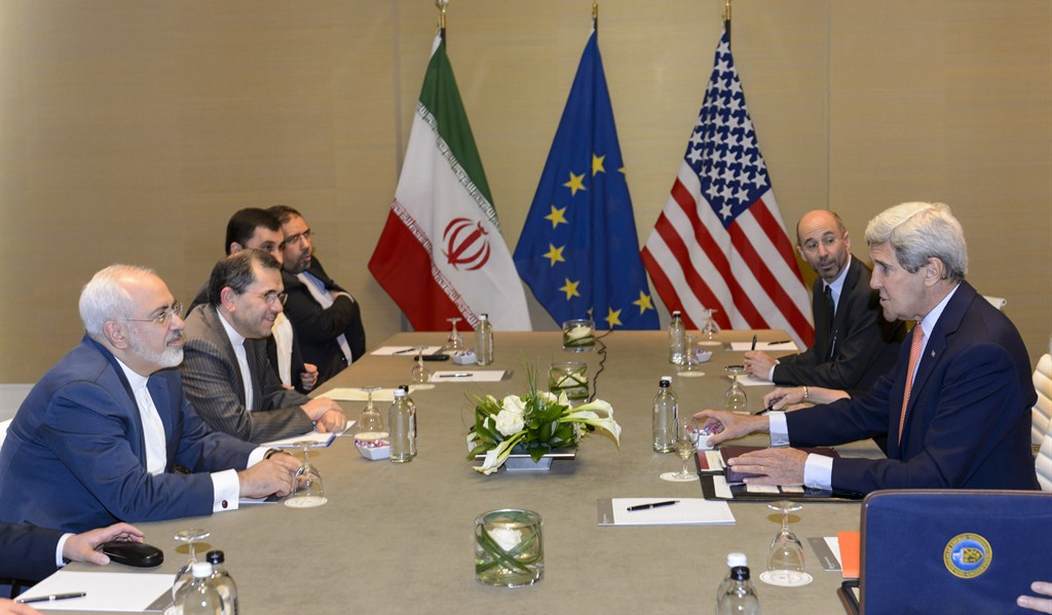The International Atomic Energy Agency (IAEA) released a troubling report about Iran's nuclear program that shows Tehran increasing its stockpile of highly enriched uranium (HEU) by more than 45 pounds. The report says that Iran now has more than 313 pounds of HEU enriched to 60%. Using Iran's advanced and illegal centrifuges, it would take just a few days to spin up the HEU to 90% or better, which is bomb-grade uranium.
The Europeans, especially France and Great Britain, want to censure Iran at the upcoming IAEA board meeting in June. But the Biden administration is demanding that France and Great Britain refrain from any action taken against Iran.
It's unclear why Washington wants France and Great Britain to back off from censuring Iran. Observers in both nations believe that Biden doesn't want to stir the Iran pot before the November election. There is a significant pro-Iran faction in the Democratic Party, and Biden may not want to rile them up before the vote.
But a censure resolution might shake things loose at the UN, forcing the Security Council to deal with Iran's nuclear program. Censure would "open the way to pushing Iran’s alleged noncompliance on nuclear issues to the U.N. Security Council for an international response," reports the Wall Street Journal.
Iran cut off oversight by the IAEA in 2023, including cameras in Iran's most sensitive nuclear sites. They allowed the IAEA to service the cameras on May 21. However, the data they collected is under seal by Iran at the nuclear sites.
Tehran does not react well to criticism of its nuclear program. Last year, after a brutal IAEA board meeting that called Iran out for its non-cooperation, Iran promptly banned several experienced European inspectors from the country.
Biden may not want a repeat of that performance by Iran.
The administration is also skeptical that a formal rebuke will achieve anything. Even if Iran’s nuclear work is eventually pushed up to the U.N. Security Council, it would likely be doomed there. Russia and China, who hold veto power at the U.N., would almost certainly veto any attempt to sanction Tehran for its activities.
This time, British and French officials have told Washington they want to press ahead with a censure resolution, saying it was time to draw a line, according to people involved in discussions.
Whether the Europeans actually would do that is unclear. If they proposed a censure motion that failed, it would be a major diplomatic coup for Tehran, suggesting Western pressure on Iran was crumbling.
During past IAEA board meetings, the U.S. has also pushed against a censure resolution, believing that a failed attempt to censure Iran would hand them a diplomatic coup. However, U.S. ambassador to the IAEA Laura Holgate warned in March that the board should be "prepared to take action."
“Iran’s level of cooperation with the agency remains unacceptable,” she said at the meeting. “The board must be prepared to take further action should Iran’s cooperation not improve dramatically.”
In a bid to contain flashpoints, U.S. officials this month held their first discussions since January with Iranian officials in Oman. The indirect talks, which involved Omani officials going back and forth between the sides, touched on regional and nuclear issues, according to people briefed on discussions.
Mark Dubowitz, chief executive of the Foundation for Defense of Democracies, said a censure resolution would help set out a record of Iranian noncompliance that could ultimately lead to a snapback of international sanctions.
Related: How Does the War in Gaza End? No Good Options for Israel
Barack Obama assured the American people in 2015 before the Senate voted on the nuclear deal that if Iran ever cheated, the sanctions that had been lifted would "snap back" into place. Nobody believed it then and no one believes it now.
Apparently, Biden is still holding out hope of salvaging the very bad deal his old boss signed onto in 2015. It's a forlorn hope born out of desperation for some kind of foreign policy win before the election.










